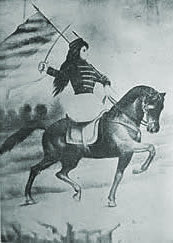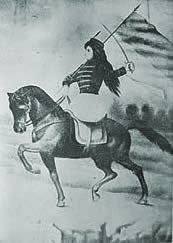
|
Women and Independence in Latin America An exploration of women's involvement in the Latin American Wars of Independence |

|

|
Women and Independence in Latin America An exploration of women's involvement in the Latin American Wars of Independence |

|
Gender:Male
Ethnic origen: White
Events:
| 1794 | - | Guanajuato | - | Not applicable | - | Born in Guanajuato. |
| 1820-1821 | - | Mexico City | - | Patriot | - | He edited Semanario Político y Literario, 1820-21. |
| 1823 | - | Mexico City | - | Patriot | - | He attended political and literary tertulias in Mexico City. |
| 1827-1828 | - | Mexico City | - | Unknown | - | He edited El Observador de la República Mexicana, 1827-28. |
| 1836 | - | Mexico City | - | Unknown | - | In 1836 he claimed, "the fair sex of Mexico had advanced considerably in the last generation". |
| 1850 | - | Paris | - | Unknown | - | Died |
Connections:
Bentham, influenced byTexts:
0 - México y sus revoluciones
0 - México y sus revoluciones
Biography:
A liberal theoretician, born in 1794. He wrote Mexico and Its Revolutions, 2 vols., 1836.
In 1836 he claimed, “‘the fair sex of Mexico’ had advanced considerably in the last generation”. Mora felt that education had improved since Colonial times, at least in the Capital. Before then their “ignorance and frivolity” had made them mere “objects of courtship”. (Arrom, 20-21, 50)
He edited Semanario Político y Literario, 1820-21, and El Observador de la República Mexicana, 1827-28. (Ruiz Castañeda, 27)
He was a mason. (Racine, Masons, 539)
He was influenced by Jeremy Bentham and Benjamin Constant and often quoted them in his speeches and essays. (Racine, Mora, 944-945)
He died in 1850.
He attended tertulias in Mexico City with Joel Poinsett, R.H Hardy and others. (Hardy, 510)
R.H. Hardy describes him as aged approx 35, with “has all the pallidness and languor which is so common in men of great talent and literary acquirements. He writes with great purity, force, and elegance, and possesses the faculty of observation in a greater degree than that of conversation. What, however, he does say, is always edifying and is listened to with great interest. He is of an amiable disposition, although perhaps too much of an enthusiast in politics. Doctor Mora possesses, I believe, the best library in Mexico. He was employed in the year 1823, by the Ayuntamiento of Mexico, to examine the desague, an interesting account of which he published, and received the thanks of the body, for his exertions and perspicuous suggestions respecting the canal.” (Hardy, 511)
Hardy expresses the wish that Mora would write a history of Mexican independence: “From his philosophical turn of mind, great reading, and actual knowledge of the political transactions of the revolution, is particularly well-qualified for writing its history, - a work much wanted, and which would be highly interesting to Europeans.” (Hardy, 520-521)
References:
Ruiz Castañeda, Carmen (editor). (1987) La prensa pasado y presente en México: catálogo selectivo de publicaciones periódicas
Werner, Michael S. (editor). (1997) Encyclopedia of Mexico
Arrom, Silvia Marina (1985) The women of Mexico City, 1790-1857
Hardy, R.W.H. (1829) Travels in the Interior of Mexico in 1825, 1826, 1827, &1828,